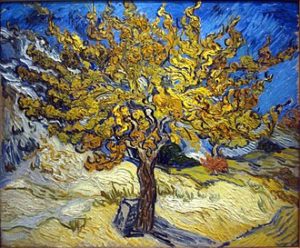A sermon preached by Christopher L. Webber at the Church of the Incarnation, San Francisco, on October 5, 2019.
Hy – per – bo – le.
That’s the key word to understand the gospel reading today. Hyperbole. Look it up on line and you’ll find lots of definitions and lots of examples.
Hyperbole is defined as “an exaggerated statement” or “extravagant exaggeration” or “a claim not meant to be taken literally.” I think we all probably use hyerbole just about every day. I could say “we use it all the time” but that would be hyperbole.
If you say to someone: “I’ve told you to clean your room a million times!” That’s hyperbole. Or if you say, “I’m so hungry I could eat a horse.” That’s hyperbole. You don’t expect someone to put a horse on your dinner plate. Or if you say, “That suitcase weighs a ton.” That’s hyperbole. You don’t expect someone to get out the scales and weigh it. And if they do, you’re going to say, “Oh, come one; you knew what I meant.” And they did. They knew exactly what you meant. Because everybody understands hyperbole even if they never heard of it. It’s hyperbole; hyperbole. It’s exaggeration for effect, to make a point dramatically.
Jesus used hyperbole. He probably thought it was pretty obvious what he was saying. But he probably never met a fundamentalist. If I said, “Faith can move mountains” you would know what I meant and you would know it’s true. And you wouldn’t expect me to relocate Mt. Tam to prove it. But somehow when Jesus says something like that we totally forget how language is used. So we read the gospel this morning and hear Jesus say:”If you had faith the size of a mustard seed, you could say to this mulberry tree, `Be uprooted and planted in the sea,’ and it would obey you,” and it worries us,  because for some reason we think that if Jesus said it, we have to take it literally – and if we can’t relocate mulberry trees that our faith is too small.
because for some reason we think that if Jesus said it, we have to take it literally – and if we can’t relocate mulberry trees that our faith is too small.
I went on line looking for examples of fundamentalists who had taken Jesus literally and had moved mulberry trees. I didn’t find any but I did find some who are worried by this text because they don’t know about hyperbole. And it was kind of funny. I found one who said, “There’s a mulberry tree right outside my window,” and he’s never yet had a reason to move it but he sort of implied that he could if he really wanted to. I can think of lots of reasons he should try it. Think how many converts he’d make. I found one on-line preacher who tried to talk around it by blaming his congregation: “I haven’t moved any mulberry trees this week and I bet you haven’t either.” But that’s not the point! That misses the point.
I don’t know where the nearest mulberry tree is, but I think most people who have them would be happy to cast them in the sea because they’re messy trees. I remember living in a town where there was one just down the street and we learned to stay away from it in summer. They produce these  tasteless berries that mess up your sidewalk and get on your shoes and stain your clothes. Worse, the male mulberry tree produces pollen that is terrible for people with asthma. Lots of cities have actually banned them for that reason. So if there were a shortcut way to cast the things in the sea they’re be a line of people ready to help. But they would need machinery, not faith. Faith can do lots of good things for you but it’s not about moving mulberry trees.
tasteless berries that mess up your sidewalk and get on your shoes and stain your clothes. Worse, the male mulberry tree produces pollen that is terrible for people with asthma. Lots of cities have actually banned them for that reason. So if there were a shortcut way to cast the things in the sea they’re be a line of people ready to help. But they would need machinery, not faith. Faith can do lots of good things for you but it’s not about moving mulberry trees.
I wish we had Hebrews 11 to read this morning, because that’s the passage we need to go with this gospel. Hebrews 11 defines faith and Hebrews 11 describes faith. It defines it as “the evidence of things not seen.” I can’t see faith but I can see what it does. I can’t see faith but I can see faithful people: I can see you here this morning because you’re faithful. So there’s evidence of faith even though we can’t see it.
Hebrews 11 describes faith by remembering one by one the Biblical characters who acted in faith. It starts with Moses: By faith Moses identified himself with the enslaved Hebrew people, by faith they passed through the Red Sea by faith they conquered the promised land by faith they endured hardship and suffering mocking and flogging, chains and imprisonment And this great cloud of witnesses, Heb rews 11 tells us, of whom the world was not worthy gives us courage to go ahead, gives us courage to move not mulberry trees but doubt and discouragement and hardship and suffering, move them out of the way, cast them in the sea, and keep going because we have faith in God’s promises. Faith enables us to move on, to keep going, because God has given us a promise greater than any tricks with mulberry trees.
rews 11 tells us, of whom the world was not worthy gives us courage to go ahead, gives us courage to move not mulberry trees but doubt and discouragement and hardship and suffering, move them out of the way, cast them in the sea, and keep going because we have faith in God’s promises. Faith enables us to move on, to keep going, because God has given us a promise greater than any tricks with mulberry trees.
The disciples said, “Increase our faith.” I’m with them. I’d like a double dose. But Jesus doesn’t really answer them. He tells them if they had even the smallest bit of faith, they could do great things. And then he moved on down the road that led to Jerusalem and they followed him. See? That’s faith: They followed him even though they didn’t know where he was going, even though they might have guessed it wouldn’t be easy. But it turned out that they had faith enough to change the world. Forget about mulberry trees. They changed the world. And it wasn’t because he taught them any special tricks or secret formulas. They got it by walking along with him day after day, day after day. And that’s where we get it too. By being here, by saying our prayers, by reading the Bible, by following Jesus on the path in front of us. Faith comes by walking with Jesus and if we do that we’ll have enough. God promises us life: changed life now, and new life hereafter. All God asks of us is faith, faith the size of a mustard seed to accept that promise and live by that faith..
Very good Chris. If I wasn’t blessing animals tomorrow, I’d plagiarise it shamelessly. My people are needing faith boosting during transition.